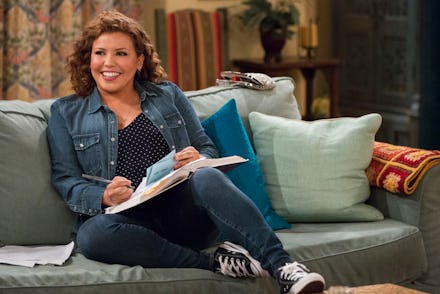Netflix’s ‘One Day at a Time’ understands what it’s like to live with mental illness

In 2017, Netflix’s One Day at a Time reboot joined a growing list of shows (including Crazy Ex-Girlfriend and You’re the Worst) featuring three-dimensional characters who also happen to be grappling with mental illness. These TV series have helped validate conditions that, for millions of people, can be isolating battles. On One Day at a Time, viewers can see Army veteran and single mom Penelope Alvarez (Justina Machado) — who’s diagnosed with depression, anxiety and post-traumatic stress disorder — come to terms with her need for antidepressants. Considering I also spent far too much time resisting treatment for my own depression and anxiety, I was thrilled to discover a relatable character like Penelope.
In its second season, which premiered Jan. 26, One Day at a Time dives deep into its main character’s psychological issues. The result is the season’s devastating ninth episode, “Hello, Penelope,” wherein Penelope, finally on track to becoming a nurse practitioner after hitting a few roadblocks earlier in the season — and embarrassed to tell her hunky new boyfriend that she’s in treatment — goes off her meds and stops attending therapy. What happens next is not pretty, but it’s a narrative risk that provided me with a kindred spirit in Penelope.
Although I’ve dealt with depression and anxiety for years, both came roaring back in the months following my daughter’s birth in 2016. The sheer joy of her existence has been compounded by endless bouts of self-loathing: I’ve felt that I wasn’t a good enough mother and believed that I was failing horribly at the juggling act of parenthood and career.
The minute Penelope started acting erratically, I recognized so much of myself in her behavior: She abruptly hurls vicious insults at concerned landlord Schneider (Todd Grinnell) — a recovering alcoholic, he’s the first to notice something is seriously off with his friend — only to collapse into a dark pool of despair. She holes up in her room, bails on work and gives her boyfriend, Max, the silent treatment.
As I watched Machado bring Penelope down to familiar levels of exhausted misery, I was crying along with her. The difference was, I wasn’t acting.
Eventually, upon the advice of her group therapy leader Pam — played by original One Day at a Time cast member Mackenzie Phillips, who’s no stranger to psychological trauma herself — a despondent Penelope takes the first step toward helping herself: She records her thoughts on her phone.
Battling depression and anxiety is hard enough when you don’t have children, so there’s no doubt that Penelope’s big rock-bottom scene would’ve been just as powerful if the character wasn’t a mom. I still would’ve recognized the bloodshot eyes, the inability to get out of bed and, probably the starkest contrast in her character, Penelope’s assertive vocal inflections downshifting to a wobbly whisper. But it’s because she’s a mother who is balancing work and raising two adolescent kids with their own challenges, that her smartphone soliloquy resonated with me the most. When Penelope reveals that she’s harboring the same humiliating secret that’s been plaguing me since my daughter was born, I lost it.
“I want so badly for [my kids] to grow up and live full, happy lives,” Penelope confesses to her phone. “But I can’t teach them how to do that because I don’t know how to do that for myself. I’m failing them.”
I have the same worry every morning when I collect my daughter out of her crib.
Also, I can relate to Penelope in the sense that she has to look beyond her family for the solace she needs. When she’s ready to play her recording back, she doesn’t do it with her mother, her children, or even her new bae sitting by her side. She does it with Schneider.
The goofy, privileged hipster serves as a surprisingly supportive figure in this episode because, as much as Penelope may want to unload on her family members, they can’t understand her pain the way Schneider can. Penelope’s feisty Cuban mother, played by the divine Rita Moreno, still harbors old-school stigmas regarding mental health treatment, calling Penelope’s group therapy her “cuckoo party.”
While I’m fortunate to have family members who encourage me to go to therapy, it can feel sometimes like there’s an underlying disappointment that I just can’t get it together on my own. So, unfortunately, talking to Mom doesn’t always work out.
But Schneider, thanks to a nicely understated performance by Grinnell, is the only one who can put his friend’s situation in perspective: After Penelope expresses frustration over the prospect of taking antidepressants forever, Schneider recounts his failed post-rehab attempt to just have “one beer” — which involved waking up “three days later in an alley” (though not the “alley” you’d expect; I won’t spoil the punchline).
“There’s something I want, but I can’t have for the rest of my life,” he says mournfully. “There’s something you don’t want, but you have to have for the rest of your life.”
Now, while a venting session with her wealthy upstairs neighbor is no substitute for Penelope visiting her doctor to get back on her medication safely, dude still speaks the truth. I’ve periodically stopped counseling over the years, thinking I’ve finally gotten my issues under control. But every time that happens, I always find myself coming back to the same conclusion: Therapy is something I have to have. And thanks to trending Twitter hashtags like this one, and smart TV shows like One Day at a Time, my reality isn’t such a lonely one anymore.